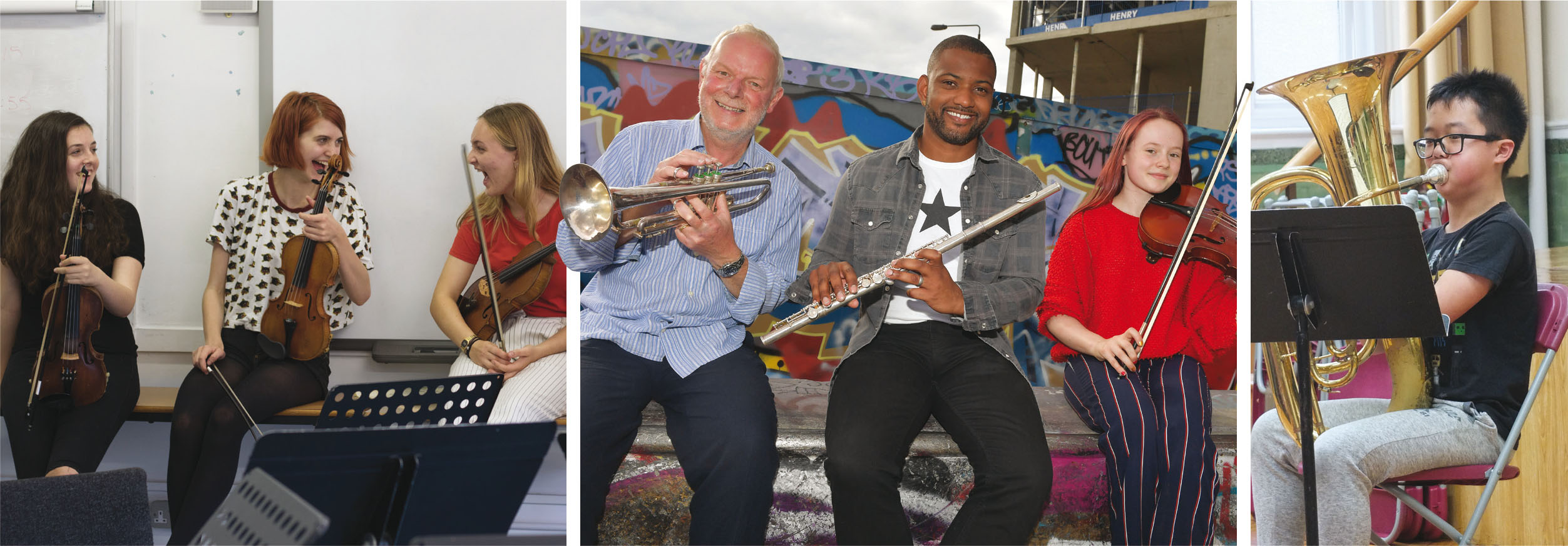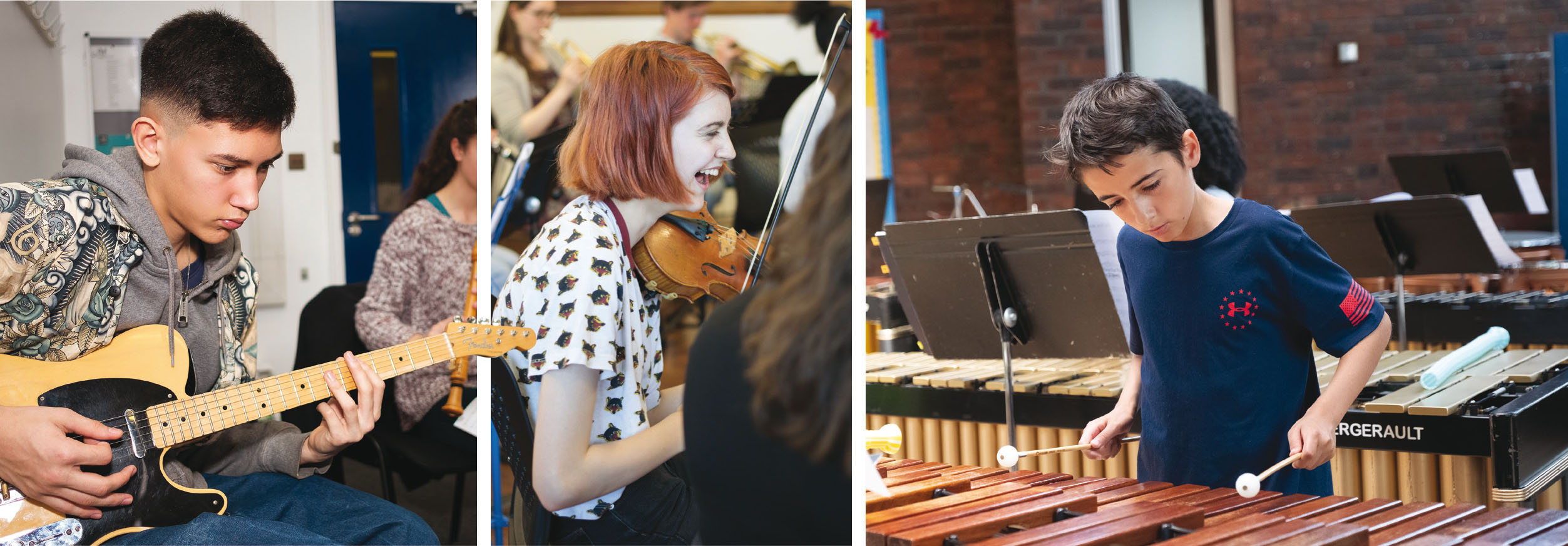
The Centre for Young Musicians (CYM), London's outstanding Saturday music centre and the body that oversees the London Schools Symphony Orchestra (LSSO), officially celebrated its half-century during lockdown. The global pandemic meant, of course, that the 10 June birthday concert was a strictly online affair. Instead of the planned event at the Barbican, the centre mounted an online showcase of 50 numbers from members of CYM past and present. The evening opened with an appearance from TV journalist Naga Munchetty, who studied at the CYM for over ten years, and referred to her experiences performing in the centre's orchestra, band and jazz ensembles as ‘the most fun and memorable times of my youth’. Performances by students were mixed in with segments from distinguished alumni, including composer Jonathan Dove. Further well-wishers included guitarist Vincent Lindsey-Clark, cellist Vashti Hunter, oboist Amy Roberts, pianist John Lenehan and jazz legend Django Bates. (The concert is available to watch in full via cym.org.uk.)
The celebrations came at a challenging period for music education. Head of CYM Geoff Harniess was determined that, despite social distancing measures, the centre would fulfil its usual timetable: ‘The first thing we had to do was to finish off the one-to-one teaching for the end of term. A lot of that happened on Microsoft Teams, before we moved over to Zoom. Clearly, we couldn't play together because of the latency issue, so we had to adapt. The one-to-one teaching worked fine, but for the orchestras, ensembles and choirs we had to be a bit more imaginative. I took the senior brass ensemble and we spent a lot of time listening to music and talking about it, and then maybe getting people to play to one another and things like that.’
In fact, every single class continued to run throughout the summer term. This included one-to-one lessons, choirs, orchestras and ensembles within each department, not to mention the mixed ensembles. ‘There's a lot of chamber music that goes on,’ continues Harniess, ‘and we also have what we call “supporting studies” – general musicianship, in other words’. Everything continued – some elements more successfully than others. Everyone shared ideas and found new ways of doing things to keep the students engaged. We have had a very few drop-outs, which was encouraging.’
‘CYM wasn't just about music, it was a whole philosophy on life. Students do better across all subjects if they study the arts as well, so, whether someone studying at the Centre became a professional or not it didn't matter: CYM was making the world a better place. The greatest thing about it was it taught us how to live in harmony with our world and fellow man. It was in my thoughts as I stood in front of the London Chamber Orchestra waiting for Kate Middleton to arrive for her wedding to Prince William. Without CYM, I would not be where I am today.’
Violinist and conductor Christopher Warren-Green, one of CYM's most distinguished alumni
Alongside all of this, Harniess had to plan as usual for the next academic year. Auditions were held remotely and places offered in early June. Harniess anticipates a mix of in-person and remote teaching – what has now come to be known as ‘blended’ learning.
‘A lot of our teachers found that some of the students made more progress and seemed more comfortable in the one-to-one remote situation – where they can feel comfortable in their own home environment. Some students who were not doing so well have actually picked up, which was an interesting development. I can see that one positive outcome might be the possibility of considering these methods even when we get back to teaching in person – having the option of going online when you need to. If a child is away, rather than trying to reschedule a face-to-face lesson, we could say, “well, you can do that one online this week”. Everyone will be familiar with it, and therefore it may become part of what we do.’
The CYM is an auditioning Saturday music centre for students between the ages of 5 and 18. Since its beginnings in 1970, it has seen more than 50,000 students pass through its doors at Morley College. Currently, more than 400 students take part in its diverse range of programmes, from classical and jazz to gamelan and musical theatre. Circumstances dictate that the CYM needs to charge fees, but the centre aims, as Munchetty pointed out in her introduction to the gala concert, to provide its services ‘irrespective of family background or the means to pay’.
The centre originally came under the auspices of the Inner London Education Authority, with the local authority funding places for talented students. Things began to change in the new millennium, as government funding gradually decreased, and in 2009 CYM became a division of the Guildhall School of Music & Drama. The City of London Corporation had already been sponsoring the LSSO as part of CYM for several years – and it continues to do so. CYM remains based at Morley College, while its administration has since moved from Westminster to the City of London.

The Guildhall School's willingness to greatly expand its under-18 provision came partly in response to the burgeoning sense that there were inequalities in music education that needed to be addressed by the big institutions. These sentiments were crystallised a few years later in Darren Henley's review, resulting in the National Plan for Music Education. Barry Ife, who was the Guildhall School's principal at the time, not only welcomed CYM in addition to the conservatoire's own Junior division, but also, together with former CYM director Stephen Dagg, set up four regional centres – in Norwich, Taunton, Peterborough and Saffron Walden. It was a mutually beneficial move; the Guildhall School was able to demonstrate that it had an extensive access scheme, independent of its own Junior Guildhall division, and the CYM retained its identity and a certain level of funding at a time of ever-decreasing education budgets.
At present, the CYM receives some bursary funding from the Guildhall School, some from its affiliated charity, the Foundation for Young Musicians, and support for 75 of its students through its status as one of the government's Music and Dance Scheme Centres for Advanced Training. But it still has to ‘pay its way’, as Harniess puts it. ‘Around half of our students get some kind of financial support, but of course it is limited. Raising money is always difficult, and it's going to be even more difficult now. Our fees are just under £2,000 a year, which, relative to the other junior conservatoires, is less expensive.’
At 50, the CYM has a proud tradition of turning out elite musicians. ‘Around a third of our leavers each year go on to study music at conservatoires or at university,’ says Harniess. ‘That's a pretty good figure – but it's not our primary objective. The way in which we're different to the Junior Guildhall is that not all of our students are there because they want to become professional musicians; many are there just to enjoy the music and to get something from it that they can take through their lives.’
Funding is understandably an ongoing major concern for the centre, and the main new initiative, named Young at Heart, aims to raise money for the CYM's bursary fund by shining a light on two major anniversaries – the CYM's 50th celebrations, and the 70th birthday of its flagship ensemble, the LSSO, which takes place in 2021 (more on this in a future edition of MT). A target of £1m has been set for the end of 2022.
The January 2021 celebrations for the LSSO have been recast as a joint live Gala for the CYM and LSSO combined, so that some of the elements planned for the 50th birthday celebration can still take place. This includes Dove's bespoke arrangement of the last movement of There Was a Child, with CYM alumnus Christopher Warren-Green conducting (11 January at the Barbican Hall, London).
‘Learning at CYM is what made me want to study music further and hopefully go into the industry in the future. I'm in my final year here and I've had so much support from the teachers and other students since the day I first started. It's made me a far more confident player.’
LSSO's principal double bassist for 2020 and Munster Trust scholar Lydienne Horsford









